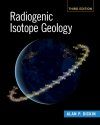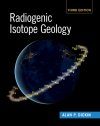![Radiogenic Isotope Geology Radiogenic Isotope Geology]()
Click to have a closer look
About this book
Contents
Customer reviews
Biography
Related titles
About this book
The third edition of Radiogenic Isotope Geology examines revolutionary changes in geochemical thinking that have occurred over the past fifteen years. Extinct-nuclide studies on meteorites have called into question fundamental geochemical models of the Earth, while new dating methods have challenged conventional views of Earth history. At the same time, the problem of global warming has raised new questions about the causes of past and present climate change. In the new edition, these and other recent issues are evaluated in their scholarly and historical context, so readers can understand the development of current ideas. Controversial theories, new analytical techniques, classic papers, and illustrative case studies all come under scrutiny in Radiogenic Isotope Geology, providing an accessible introduction for students and critical commentary for researchers.
Contents
1. Nucleosynthesis and nuclear decay
2. Mass spectrometry
3. The Rb-Sr method
4. The Sm-Nd method
5. Lead isotopes
6. Isotope geochemistry of oceanic volcanics
7. Isotope geochemistry of continental rocks
8. Osmium isotopes
9. Lu-Hf, Ba-La-Ce, and K-Ca systems
10. K-Ar, Ar-Ar and U-He dating
11. Noble gas geochemistry
12. U-series dating
13. U-series geochemistry of igneous systems
14. Cosmogenic nuclides
15. Extinct radionuclides
16. Fission track dating
Appendix 1: chart of the nuclides
Appendix 2: meteorite types
Customer Reviews
Biography
Alan P. Dickin is Professor of Geology at McMaster University, Ontario.
By: Alan P Dickin(Author)
550 pages, 622 b/w illustrations
Reviews of previous editions:
"[...] a masterly overview of the history, principles, experimental techniques and practical applications of this wide-ranging and burgeoning field [...] This book will be of very widespread interest and will be routinely used by practising academic and industrial geologists and geochemists."
– Anthony E. Fallick, Times Higher Education Supplement
"Dickin clearly and concisely reviews an enormous breadth of literature [...] This is a notable contribution to the scientific literature on radiogenic isotope geology. It provides a readable introduction to applications of radiogenic isotopes for scientists from other disciplines and an important reference for students and researchers working in isotope geology."
– Joel D. Blum, Nature
"I enjoyed Dickin's writing style; it is authoritative, and his historical perspective both places ideas in context and provides well-paced introductions to the more difficult topics."
– C. J. Hawkesworth, Journal of Petrology
"The author takes us on a well written tour of nearly all methods of investigating Earth and planetary sciences using isotopes produced by radioactive decay [...] the book is recommended without reservation."
– Ian W. Drummond, OUGS Journal
"This book will undoubtedly be 'the' handbook of isotope geology for some time to come."
– Christopher Kendall, The Leading Edge
"[...] an excellent new text [...] a very welcome addition to the field [...] I certainly recommend Radiogenic Isotope Geology to any scientist who is interested in the field, particularly in recent developments."
– Richard Muller, Physics Today
"Dickin's book successfully covers every major area of radiogenic isotope geochemistry and is unmatched by any other [...] This tome represents a great contribution to the geochemistry literature. It is a particularly useful book for advanced undergraduate and graduate students [...]"
– Alex N. Halliday, Economic Geology
"[...] a concise and up-to-date summary of the various techniques and applications in this branch of the earth sciences."
– Martin J. Whitehouse, Geological Magazine
"Dickin has concisely and quite completely covered the applications of this field to geology [...] Clearly written and comprehensive,"
– E.R. Swanson, Choice
" [...] valuable, broad-ranging textbook [...] a detailed and sophisticated description of the principles and applications of all currently used radioactive decay schemes [...] The author clearly demonstrates his profound knowledge of the entire field [...] a first-rate, clearly written and logically presented book that deserves a place in every serious geological library, on every isotope geologist's bookshelf and, not least, in the isotope laboratory itself [...]"
– Stephen Moorbath, Geochimica et Cosmochimica Acta
" [...] a badly-needed and first-rate treatment of a difficult but important field. It should be required reading for all serious students and researchers in crustal evolution and petrology."
– Paul D. Lowman, Jr., Laboratory for Terrestrial Physics
"I recommend the book to geologists, geophysicists and geochemists, who ddeal with problems of earth strudture, age and evolution as a source for information. [...] the book should be in all libraries at universities with faculties of geology or chemistry."
– Jadwiga A. Jarzyna, Pure Appl. Geophys.



































